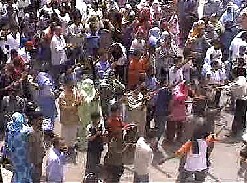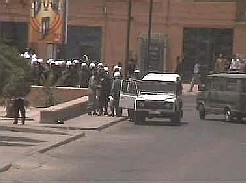|
Western Sahara Human rights | Politics Western Sahara riot met with mass arrests
The new and large wave of riots in Western Sahara's capital El Aaiun started small and peacefully on Monday, as well-known human rights activists protested against limited freedoms. For unknown reasons, however, the activists suddenly were joined by hundreds of ordinary Sahrawi citizens, protesting against the Moroccan occupation of Western Sahara and calling for freedom.
While the protests in El Aaiun are intensifying from day to day, the Sahrawi "Intifada" today also has spread to other cities and towns in Western Sahara and Morocco. There have been several reports of confrontations in the Sahrawi towns of Smara and Dakhla and of protesting Sahrawis in the Moroccan cities of Tan Tan and Rabat. At the Souissi II University in the Moroccan capital, Rabat, hundreds of Sahrawi students today were reported to have thrown stones at Moroccan police units trying to stop the demonstrations. Anti-riot units of the police engaged in battles with the students that reportedly have left many wounded. An unknown number of arrests were also to have been produced. According to the exiled Sahrawi government, the riots in El Aaiun and Smara are developing into a true Intifada based on the Palestinian model. The Polisario independence movement - which forms the exiled government - has so far not taken responsibility for the sudden outbreak of riots. Observers also believe that the riots have been produced autonomously out of frustration over the Moroccan occupation and the Kingdom's unwillingness to engage in the UN-led peace process. Sahrawi exiled President Mohamed Abdelaziz meanwhile is coming under double pressure to resume the armed struggle against Morocco, which was halted by a 1991 ceasefire. The estimated 160,000 Sahrawi refugees in the Algerian desert and the population of the occupied territory have lost hope in a negotiated settlement after Morocco's King Mohammed VI withdrew his agreement to a referendum over independence - which was the pretext for the 1991 ceasefire. So far, President Abdelaziz has limited his reaction to the riots in Western Sahara to sending an appeal to the UN Security Council, asking the UN peacekeepers in the territory to protect the Sahrawi demonstrators. The Polisario leader however recently hinted that the ceasefire could not last for ever if the Moroccan part is not interested in continuing the peace process on the basis of earlier treaties. The movement this weekend exposed its troops and weapons in a large military parade, demonstrating its power and willingness to resume the armed struggle. By staff writers © afrol News - Create an e-mail alert for Western Sahara news - Create an e-mail alert for Human rights news - Create an e-mail alert for Politics news
On the Afrol News front page now
|
front page
| news
| countries
| archive
| currencies
| news alerts login
| about afrol News
| contact
| advertise
| español
©
afrol News.
Reproducing or buying afrol News' articles.
You can contact us at mail@afrol.com









